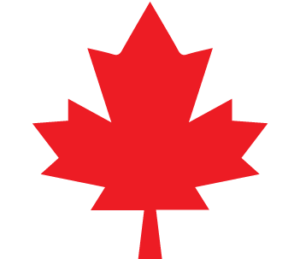
1
The People
- The population in Canada in 2011 was approximately 34.3 million
- 81 percent of the total population resides in cities
- Canadians can deduct a number of things from their tax software, but I bet you didn’t know that dog food is tax-deductible in Canada
- About 90% of Canada’s population is concentrated within 160 kilometers (100 miles) of the Canada/US border
- 15.9% of the population is 65 or older. 68.5% are between the ages of 15 and 64
- The median age is 41 years
- The average life expectancy at birth is 81.16 years – the sixth highest in the world
- Canadians like to finish a sentence with the word “eh”
- If you want to make an American smile, ask a Canadian to say out and about. It works every time
- 280,681 new permanent residents were welcomed to Canada in 2010. That number does not include temporary workers or foreign students
- Canadians call the one dollar coin the loonie. When in full production, 15 million loonies can be produced per day
- 17% of Canadians are daily smokers
- The average Canadian watches 21 hours of television per week. 128,000 Canadian households have TV’s in the bathroom
- The age at first marriage for men is 29 years, 27.4 years for women
- The average household size in Canada is 2.6 people
- There have been 10 Nobel Prize laureates in Canada
- Canadians generate 640 kilograms per person per year of waste
2
Geography
- Canada is the second largest country in the world
- The highest tides in the world occur in the Bay of Fundy in New Brunswick
- The capital of Canada is Ottawa, the second coldest capital in the world
- Canada has ten provinces and three territories
- Canada has the longest coastline of any country in the world at 243,977 kilometers – 151,600 miles
- Montreal is the world’s second largest French speaking city after Paris
- Six cities in Canada have a population of over 1 million: Toronto, Montreal, Vancouver, Calgary, Edmonton and Ottawa
- Canada is lucky to have 9% of the world’s renewable water supply!
- The largest non-polar ice field in the world can be found in the St. Elias Mountains, Yukon Territory. It covers an area of 40 570 square kilometers of which 16,900 square kilometers are located in Canada, the remainder being in Alaska
- Canada has six time zones
- The longest highway in the world is the Trans-Canada Highway which is over 7604 kilometers (4725 miles) in length
- The world’s most northerly sand dunes are in Athabasca Provincial Park in northwest Saskatchewan. They are 30 meters high
- Half of the country is covered with forests, which should come as no surprise considering one-tenth of the world’s forests are here
- The highest mountain in Canada is Mount Logan, Yukon Territory, 5959 meters (19,551 feet)
- Wasaga beach is the longest fresh water beach in the world
- Despite being a huge country, Canada has the fourth lowest population density in the world, with only three people living per square kilometer! Almost half of the population in Canada were born in other countries
- The coldest temperature ever recorded in Canada was -63C (-81.4F) on February 3, 1957 in Snag, Yukon
- Alert, in Nunavut Territory, is the northernmost permanent settlement in the world
- The highest waterfall in Canada is Della Falls, British Columbia, 440 meters high (1444 feet)
- The border between Canada and the United States is officially known as the International Boundary. It is 5,525 miles long, including the 1,538 miles between Canada and Alaska. It’s the world’s longest unprotected border
- Ocean Falls, British Columbia has on average 330 days of rain per year
- Estevan, Saskatchewan is reportedly the sunniest place in Canada with 2,537 hours of sunshine per year
- Nakwakto Rapids, Port Hardy’s legendary dive destination, boasts the strongest current in the world – with speeds of up to 18.4 miles per hour
- Three of Canada’s islands make the top ten for size in the world – Baffin, Ellesmere and Victoria
- Manitoulin Island is the largest freshwater island in the world
- Two of the largest lakes in the world are found in the Northwest Territories – Great Bear Lake and Great Slave Lake
- Nunavut takes up one fifth of Canada’s total land area
- Calgary is famous for its’ Chinooks – a weather phenomenon that can raise the temperature by 10 degrees in a matter of minutes.
3
Sports
- Hockey and lacrosse are Canada’s national sports
- The baseball glove was invented in Canada in 1883
- Canada has hosted the Olympic Games 3 times; 1976 in Montreal, 1988 in Calgary and 2010 in Vancouver
- Canadian sports icons include Wayne Gretzky (hockey), Steve Nash (basketball), Mike Weir (golf) and Cassie Campbell (women’s hockey)
- Whistler, British Columbia is consistently ranked as one of the best places in North America for downhill skiing
- The Royal Montreal Golf Club, founded in 1873, is the oldest golf club in North America
- The first indoor ice hockey game took place on March 3, 1875 at the Victoria Skating Rink in Montreal
- Ice hockey, football and baseball are Canadians favourite spectator sports



